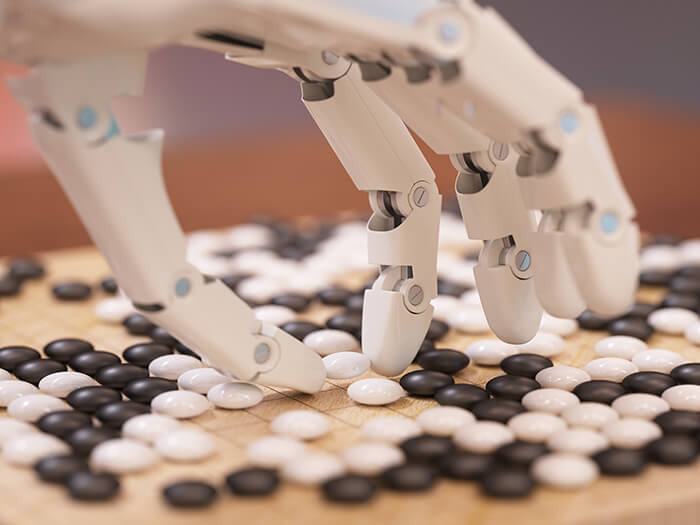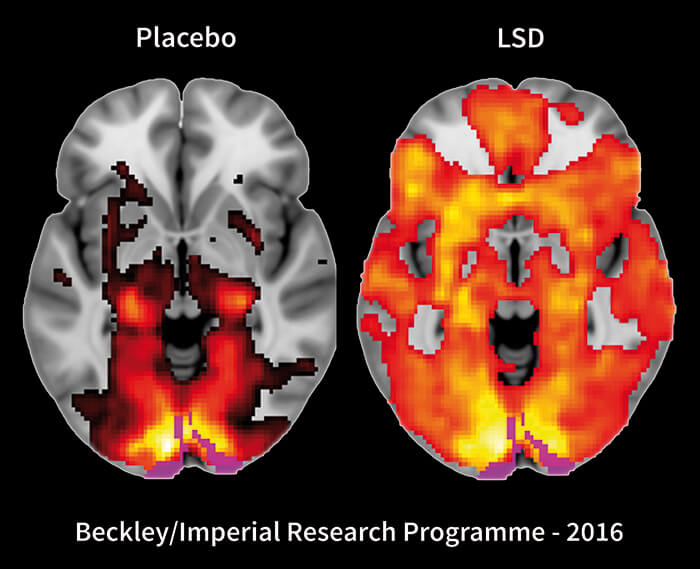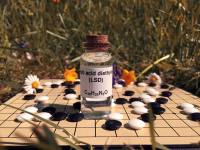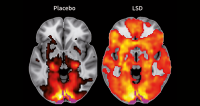
Why Go and Artificial Intelligence are the Perfect Tools for Studying the Effects of Psychedelics

Go requires intuitive pattern recognition and creative thinking, both of which can be enhanced by psychedelics
Like consciousness itself, the intangible concept of creativity is a frustratingly abstract phenomenon that is as hard to define as it is to measure. Though psychedelics like LSD, psilocybin and DMT have all been shown to generate fluid patterns of brain activity that appear to enrich consciousness and enhance creativity, finding a means of scientifically quantifying these experiential effects poses a major challenge.
In an upcoming study, the Beckley/Imperial Research Programme will pit humans against an artificial intelligence (AI) system in order to determine whether LSD microdosing leads to an increase in proficiency at the ancient Chinese strategy game of Go. This particular task was chosen because, more so than any other game known to man, Go requires a particular attribute that is as indefinable as creativity yet also one of its main components: intuition.
For this same reason, Go has also become something of a barometer for the ‘humanity’ of AI units, as it demands that a machine not simply memorise every possible move and outcome encompassed by the game, but that it intuit and think creatively. This is because the total number of possible unique Go games that can be played stands at 10360, which is roughly equal to the total number of atoms in the universe multiplied by itself four times.
With so many opportunities for variation, no computer can visualise every possible outcome arising from each new move, which is why the recent success of AlphaGo – Google DeepMind’s Go-playing AI – is so impressive. Having last year defeated world champion Lee Sedol, the machine has now beaten its second world number one, Ke Jie, by three games to zero.

LSD generates an increase in integrated whole-brain connectivity, leading to more creative modes of thought and cognition
Amazingly, even AlphaGo’s creators aren’t entirely sure how it rationalises its game strategy – a testament to the human-like ambiguity of its complex meditations.
What is known is that AlphaGo makes its assessments based on two so-called ‘deep networks’, known as the ‘value network’ and the ‘policy network’. Made up of multiple layers of hidden processing, these networks are not pre-programmed by the AI’s designers, but are continually honed and refined by AlphaGo as it plays millions of games against itself, sharpening its feel for the game and its ability to play creatively.
Following its crushing defeat of the two greatest Go players on the planet, AlphaGo has now been retired by its creators, who say they plan to repurpose their extraordinary AI system for new challenges like curing diseases and reducing global energy consumption.
And while AlphaGo itself won’t be used in the upcoming microdosing study, its success has paved the way towards a new model for the study of human consciousness. By incorporating Go-playing AI systems into psychedelic research, it may now be possible to reliably measure the impact of these compounds on intuition, thereby providing robust correlations between alterations in brain activity and changes in creativity.
Amanda Feilding will soon be taking part in a Reddit AMA from TheBeckleyFoundation account. Updates soon!
Words: Benjamin Taub
Podcast
- All
Links
- All
Support
- All
BIPRP
- All
Science Talk
- All
Amanda's Talks
- All
- Video Talk
- Featured
- 2016 Onwards
- 2011-2015
- 2010 and Earlier
- Science Talk
- Policy Talk
One-pager
- All
Music
- All
Amanda Feilding
- All
Events
- All
Highlights
- All
Psilocybin for Depression
- All
Current
- All
Category
- All
- Science
- Policy
- Culture
Substance/Method
- All
- Opiates
- Novel Psychoactive Substances
- Meditation
- Trepanation
- LSD
- Psilocybin
- Cannabis/cannabinoids
- Ayahuasca/DMT
- Coca/Cocaine
- MDMA
Collaboration
- All
- Beckley/Brazil Research Programme
- Beckley/Maastricht Research Programme
- Exeter University
- ICEERS
- Beckley/Sant Pau Research Programme
- University College London
- New York University
- Cardiff University
- Madrid Computense University
- Ethnobotanicals Research Programme
- Freiburg University
- Medical Office for Psychiatry and Psychotherapy, Solothurn
- Beckley/Sechenov Institute Research programme
- Hannover Medical School
- Beckley/Imperial Research Programme
- King's College London
- Johns Hopkins University
Clinical Application
- All
- Depression
- Addictions
- Anxiety
- Psychosis
- PTSD
- Cancer
- Cluster Headaches
Policy Focus
- All
- Policy Reports
- Advisory Work
- Seminar Series
- Advocacy/Campaigns
Type of publication
- All
- Original research
- Report
- Review
- Opinion/Correspondence
- Book
- Book chapter
- Conference abstract
- Petition/campaign
Search type


